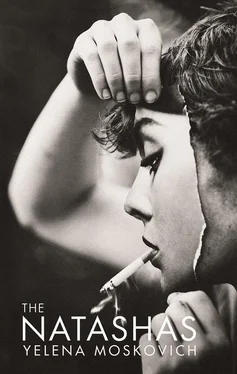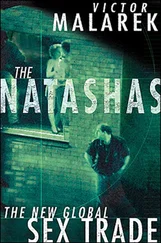“When are you coming back?” he finally asked.
The girl blinked then looked away. Her eyes drifted to the wall behind her. In a low voice, she spoke more to that open space than to César.
“I wish all grampas and gramas go into earth already and let me live new life…”
César wanted so deeply to say something in return that would make her previous statement a joke. He thought about nudging her lightly on the forearm and saying, “Let’s kill ’em all then!” But as he rolled his tongue on the top of his mouth, the words couldn’t find their beginning.
“I vant be great-time actriss, César…” the girl said with such desperation, César almost bit his own tongue by accident.
“…like on big international film… speaking French and speaking English! Here dis is… possible… Back… you know…” Her finger rose from her lap and pointed limply east, “there, not possible…”
She lowered her finger back down to the others. “Vy I have go back and be… not possible…?”
The girl sat still for a moment then suddenly looked sharply at César. “I am so sad , César, so sad , becuz I sink I can be GREAT-IMPORTANT for HISTORIE! ”
She fixed her charged eyes on César, and looked to him as if she were being electrocuted. César held his breath and stared back. Finally, she let her shoulders go and looked down.
“…Ven I go back…” her finger rose again, pointing sleepily east, “ven I zere… I like… forget all dis. I sink only: you werth nahsing, stupitt gurl. Before werth nahsing, now werth nahsing, forward go werthing nahsing, forever stupitt gurl…”
After she left, César went online and looked up Jewish burial traditions. As he read from his computer screen, he imagined Mendel X’vich folded in his coffin. The coffin being lowered into the earth, and the rabbi pronouncing, Al mekomo yavo veshalom. “May he go to his place in peace.”
Then, one by one, the family members would pierce the point of a shovel into the ground, lever a bit of soil and throw it into the grave. He heard precisely what the soil would sound like when it hit the wood of the coffin, like a set of pens suddenly dropped to the floor.
Months later, he received an e-mail from her in an oddly jovial tone, not resembling the heavy voice she had left him with.
You no, the grave-hole look like hole where big tooth pulled out. So, when I was stand at funeral, I was think this: Look at me, I stand inside big, big mouth where all time around me God pull toothes. This time he pull Grampa out. When he pull me?
César had replied asking again when she’d be coming back to school. She never answered. She never came back to school. César convinced himself that she must be an established actress now at some national Balkan theatre, playing roles like one of Chekhov’s three sisters. The one who keeps hassling about Moscow. To Moscow! To Moscow! It was Irina’s line, if memory served César correctly. Yes, Irina. The girl’s name, though, he suddenly couldn’t recall.
5
César scanned the old fountain as if searching for her name there. Above the rim of the basin, there was a stone-work Egyptian head. Its eyes were hollow and its mouth was open, where a stream of water should have been.
Oddly enough, this small, unused fountain of weeds with its Egyptian head reminded César that he was in Paris. Paris, a city organised like a war survivor who keeps tucking his vestiges into nooks that have a sense of logic only to him. In passing, if the old fountain could speak, it would comment with a beady voice: “Oh yes, and this is from when I got liberated in Cairo and had to hitchhike past those damn pyramids all the way home to your Gramma!”
César turned away from the dead end and walked toward the other end of the street. He looked at the street sign, rue Alfred Stevens . It opened on to another street, wider and populated with footsteps and passing cars. Without looking at that street name, César turned on to it and began to run. Rue des Martyrs.
IX
Telo, Nomer, Chiffre, Youpka…
1
Polina continued to speak with an easy rhythm, her eyes surveying different parts of Béatrice’s face.
“ Telo, Nomer, Chiffre, Youpka… ”
“…A woman from Eastern Europe can be sold for 800 US dollars to, say, Amsterdam or Prague or Istanbul. Whether she’s Bulgarian or Ukrainian or Latvian, to the customers, she’s Russian. Whether she is Pavla or Olena or Salomeya, to the customers, her name is Natasha . Once the money is exchanged and her passport taken from her, it is then that she leaves her body.”
2
“To go missing. What a phrase. Do you realise? As if missing is a place one must get to. One day someone leaves their house, goes for a walk, and walks and walks and walks, until they get missing.”
3
Béatrice listened. The words floated out of Polina’s mouth and seeped into Béatrice like clouds. Polina swept her hair behind her shoulder. She continued.
“I met an American woman who was travelling around the Ukrainian–Russian border, from Kharkiv to Belgorod, trying to trace her roots. You know the type, watercolour eyes, dusty hair cut into a bob, neat and efficient travel clothes and a pearly row of teeth inside her systematic smile. One of those left-over-vich generations. Dedicated. Even managed to learn a good basis of Russian and a couple of Ukrainian phrases. Then, at the Zheleznodorozhny train station in Belgorod she had her wallet stolen. She ran up to a man who was looking at the timetable and panted in broken Russian that someone had stolen her wallet. The man scratched his coarse chin and followed the zipper down the centre of her fleece jacket. He then pointed to the police office at the bottom of the escalator. She thanked the man excessively and hurried down the escalator. At the bottom, almost hidden from the foot circulation of the travellers was a closed door with “ Politsiya ” written on it. She tried the door, but it was locked. She looked at her watch ( At least I still have my watch , she tried to remain positive). It was lunchtime. The police had to eat, she reasoned.
The woman paced back and forth outside the door, only a few steps at a time. She thought of all the things in her wallet. She thought of their order and value. The small pieces of paper with new-found Russian words she had been collecting and trying to learn during her trip. The address of the American Embassy she had noted just in case. The photo of her ex-husband with his arm around their now-adult son. And, oh yes, which credit cards needed to be cancelled in what order.
Time passed, and the torn-off paper pieces, her ex-husband’s arm around their son, the to-be-cancelled credit cards, balled together until she felt bloated with a general sense of loss. She stopped pacing. Her hands drifted, touching the wall, the doorknob, the latched zipper of her fleece jacket. She smoothed her fingers around the bone of her wrist, then came against the contour of her watch. She looked at it again. It may be time for tea now, she thought. The police here may drink their tea at this hour…
She let her wrist go loose and time fell away. Her eyes wandered the walls. They traced the door frame, then followed across the floor line, then moved back up to a poster full of times in columns. She looked over lists of times, passing full days and starting over again, then her eyes drifted to a bulletin board next to the door of the police room. It was tacked with photocopies of faces and handwritten notes.
“ Propavshi’ye bez vesti ”
Читать дальше












